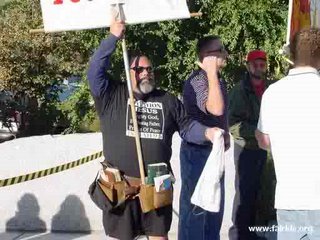 Last Saturday and Sunday the Church of Jesus Christ of Latter-day Saints held its General Conference in Salt Lake City. I had the privilege of participating in Operation Loving Kindness sponsored by the ministry of Standing Together in connection with the conference on Saturday. The purpose of Operation Loving Kindness is for traditional Christians from a variety of area churches to share their love and support with Latter-day Saints as they enter and leave from their participation in General Conference. As the throngs of Mormons walked by we stood near the conference center and wished Mormons a good morning, and shared our love and support for them as individuals and as a people.
Last Saturday and Sunday the Church of Jesus Christ of Latter-day Saints held its General Conference in Salt Lake City. I had the privilege of participating in Operation Loving Kindness sponsored by the ministry of Standing Together in connection with the conference on Saturday. The purpose of Operation Loving Kindness is for traditional Christians from a variety of area churches to share their love and support with Latter-day Saints as they enter and leave from their participation in General Conference. As the throngs of Mormons walked by we stood near the conference center and wished Mormons a good morning, and shared our love and support for them as individuals and as a people.One of the fascinating aspects of participation in this event was the variety of responses from Mormons as well as the notorious "street preachers."
The response of Latter-day Saints was varied as one might expect, with some expressing an understandable hesitancy and concern over non-Mormons standing near the facility associated with General Conference. But the vast majority received us warmly and expressed their appreciation for our presence and expressions of kindness. A handful even went so far as to approach us, offer us a handshake, and thank us for our efforts and sentiments.
While the reactions of Latter-day Saints was of interest, the reaction of the street preachers was even more interesting. The handful of preachers were scattered up and down the main street that led to the conference, signs with scripture verses and derogatory slogans held high. They alternated between preaching messages of denunciation at Mormon passers by, and when LDS crowds thinned, they took aim at those of us affiliated with Standing Together, even going so far as to denounce us as heretics and unbelievers. (As an aside, the street preachers assumed they were presenting the gospel that was being rejected by heretics, when in fact no contextualized communication was taking place across the subcultures of evangelicalism and Latter-day Saints. Their sermons amounted to little more than a harangue that had no positive appeal and represented poor communication skills, even for evangelicals who might share aspects of their worldview.) During these dismissive sermons I was able to feel for just a moment some of the rejection and judgmentalism that Latter-day Saints must feel when they are the target of this aggressive form of "evangelism."
My experiences at General Conference came during a week when I also received a few emails from a critic of my blog on the topic of Mormonism. He began our brief exchange by asking whether I believed Mormons were rightly viewed as "enemies of God" which included his citation of Romans 11:25 which refers to ethnic Israel's becoming the enemy of God for the grafting in of the Gentiles into the Kingdom of God. As our exchanges continued it become increasingly evident that this person was looking for any kind of biblical justification for regarding Mormons as enemies of God, and presumably of evangelicals.
I believe the attitudes and behaviors of the street preachers and my email inquirer share a common thread, and that is a tendency to view the Mormon people (and not merely Mormonism) as an evil worthy of our denunciation and condemnation, but precious little else. While Christ surely engaged in moments of condemnation, a quick review of these instances in the New Testament reveals that he reserved such judgments for the religious leaders, not for the common people of various stripes, whether Jew or Samaritan (whom the Jews presumably thought were the enemies of God as well). Perhaps if Christ were to have made his first appearance in our time he would in like manner have given his most stern rebuke to corrupt Christian leaders while extending his mercy and invitation to the Kingdom to those some evangelicals perceive as enemies of God.
At any rate, I find it interesting that when evangelicals engage in acts of kindness and love for Mormons and engage in ways of ministry that challenge the status quo of confrontation, the attack quickly shifts to an expanded collection of targets that also includes fellow evangelicals. While there are certainly divergences of opinions and methodologies among the countercult community (to a limited degree), my experiences with both the countercult and the street preachers leads me to wonder whether they do not inhabit the same spectrum of ministry separated by degrees rather than by kind.
No comments:
Post a Comment